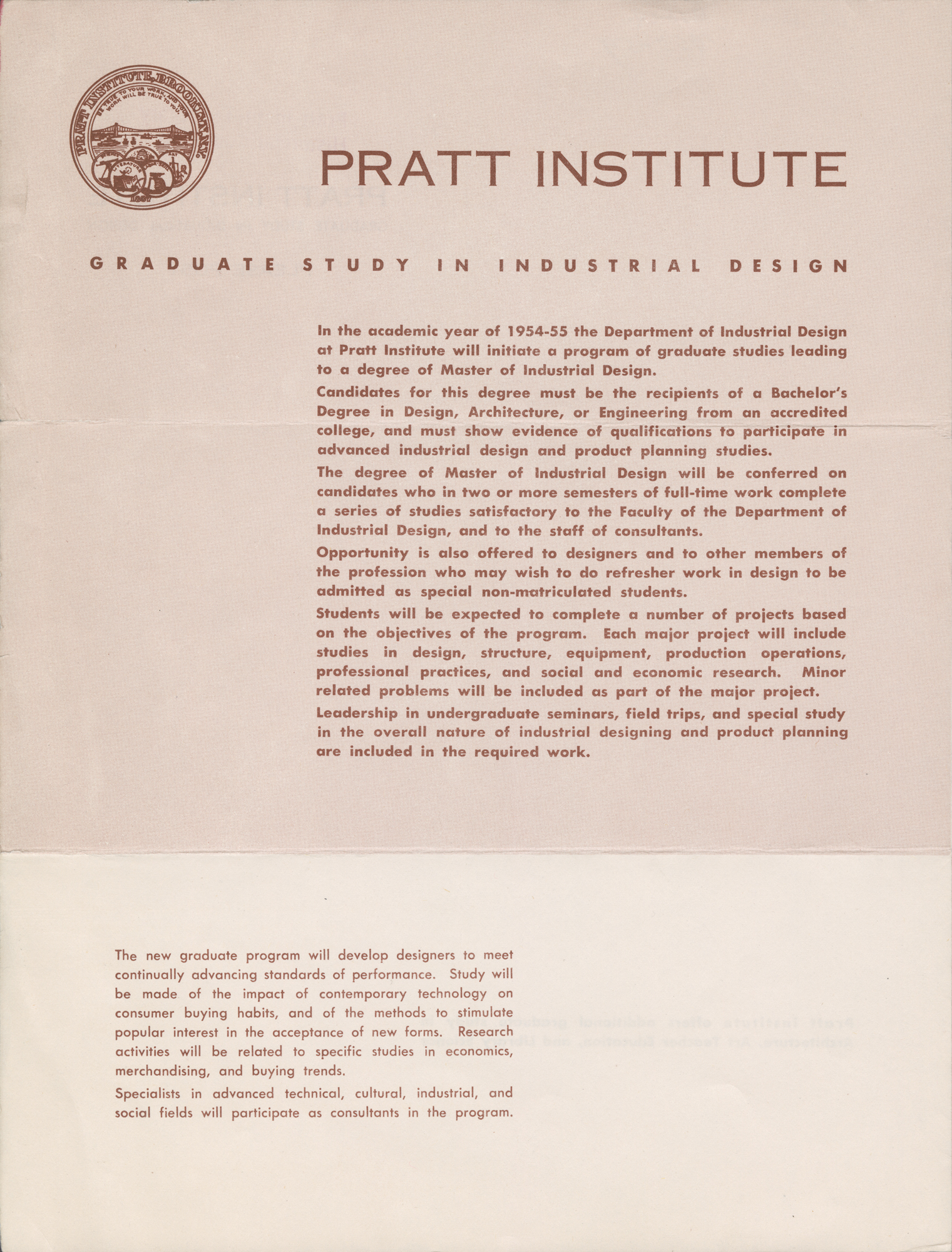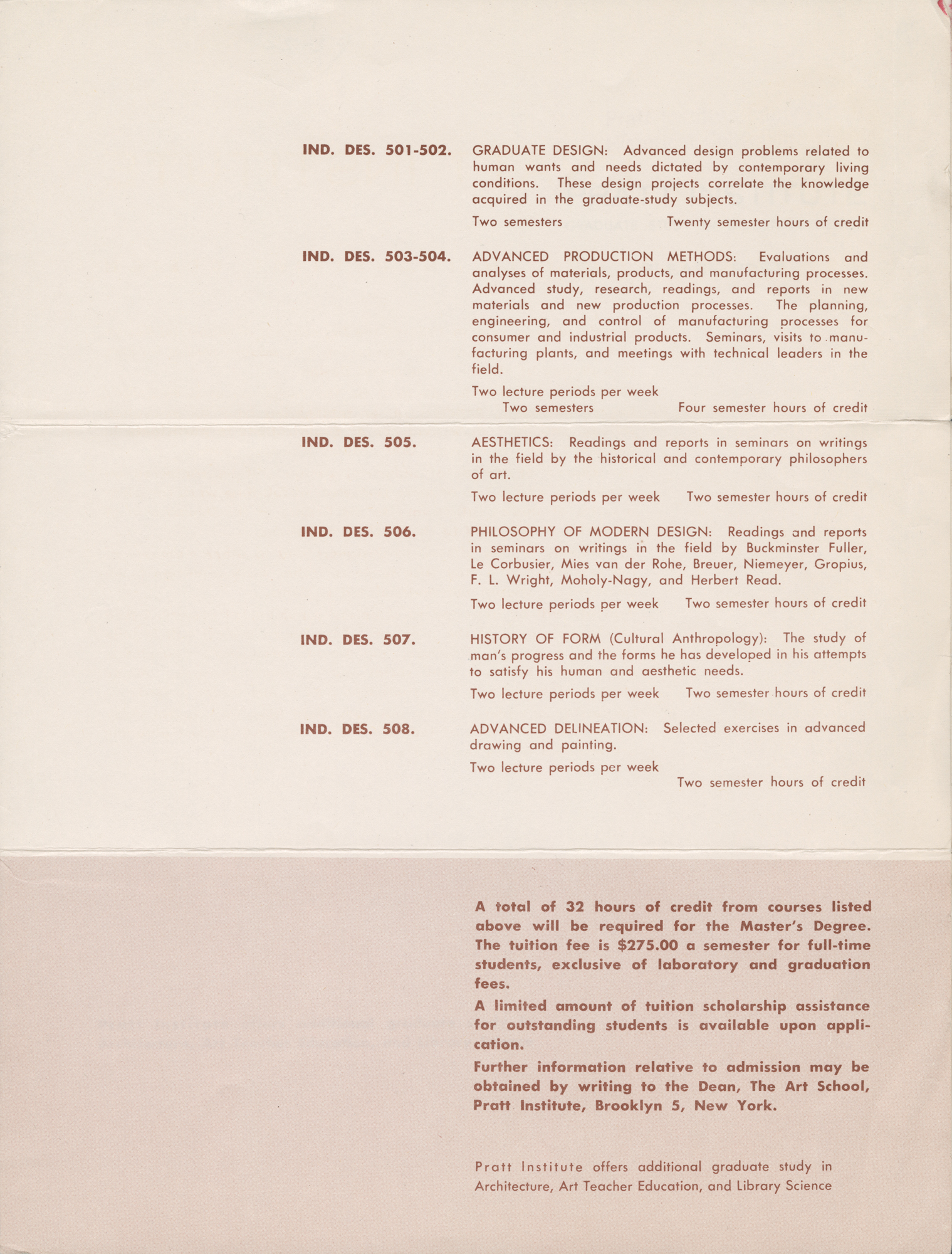1954-55 Graduate Study In Industrial Design Brochure


PRATT INSTITUTE
GRADUATE STUDY IN INDUSTRIAL DESIGN
In the academic year of 1954-55 the Department of Industrial Design at Pratt Institute will initiate a program of graduate studies leading to a degree of Master of Industrial Design.
Candidates for this degree must be the recipients of a Bachelor’s Degree in Design, Architecture, or Engineering from an accredited college, and must show evidence of qualifications to participate in advanced industrial design and product planning studies.
The degree of Master of Industrial Design will be conferred on candidates who in two or more semesters of full-time work complete a series of studies satisfactory to the Faculty of the Department of Industrial Design, and to the staff of consultants.
Opportunity is also offered to designers and to other members of the profession who may wish to do refresher work in design to be admitted as special non-matriculated students.
Students will be expected to complete a number of projects based on the objectives of the program. Each major project will include studies in design, structure, equipment, production operations, professional practices, and social and economic research.
Minor related problems will be included as part of the major project.
Leadership in undergraduate seminars, field trips, and special study in the overall nature of industrial designing and product planning are included in the required work.
The new graduate program will develop designers to meet continually advancing standards of performance. Study will be made of the impact of contemporary technology on consumer buying habits, and of the methods to stimulate popular interest in the acceptance of new forms. Research activities will be related to specific studies in economics, merchandising, and buying trends.
Specialists in advanced technical, cultural, industrial, and social fields will participate as consultants in the program.
IND. DES. 501-502.
GRADUATE DESIGN: Advanced design problems related to human wants and needs dictated by contemporary living conditions.
These design projects correlate the knowledge acquired in the graduate-study subjects.
Two semesters
Twenty semester hours of credit
IND. DES. 503-504. ADVANCED PRODUCTION METHODS: Evaluations and analyses of materials, products, and manufacturing processes.
Advanced study, research, readings, and reports in new materials and new production processes.
The planning, engineering, and control of manufacturing processes for consumer and industrial products.
Seminars, visits to manufacturing plants, and meetings with technical leaders in the field.
Two lecture periods per week
Two semesters
Four semester hours of credit
IND. DES. 505.
AESTHETICS: Readings and reports in seminars on writings in the field by the historical and contemporary philosophers
Two lecture periods per week Two semester hours of credit
IND. DES. 506.
PHILOSOPHY OF MODERN DESIGN: Readings and reports in seminars on writings in the field by Buckminster Fuller, Le Corbusier, Mies van der Rohe, Breuer, Niemeyer, Gropius,
F. L. Wright, Moholy-Nagy, and Herbert Read.
Two lecture periods per week Two semester hours of credit
IND. DES. 507.
HISTORY OF FORM (Cultural Anthropology): The study of man’s progress and the forms he has developed in his attempts to satisfy his human and aesthetic needs.
Two lecture periods per week Two semester hours of credit
IND. DES. 508.
ADVANCED DELINEATION: Selected exercises in advanced drawing and painting.
Two lecture periods per week
Two semester hours of credit
A total of 32 hours of credit from courses listed above will be required for the Master’s Degree.
The tuition fee is $275.00 a semester for full-time students, exclusive of laboratory and graduation fees.
A limited amount of tuition scholarship assistance for outstanding students is available upon application.
Further information relative to admission may be obtained by writing to the Dean, The Art School, Pratt Institute, Brooklyn 5, New York.
Pratt Institute offers additional graduate study in Architecture, Art Teacher Education, and Library Science